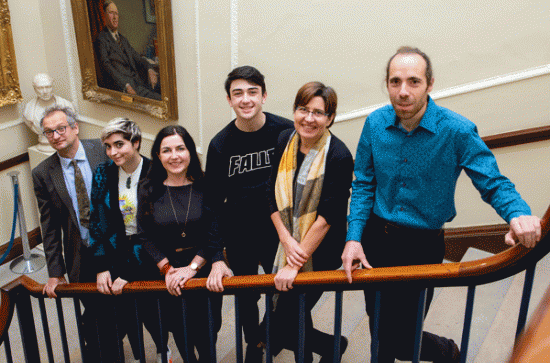
A visit to Dublin by international climate change experts this week proved educational for Irish transition year students who participated in a special event organised by Maynooth University climatologist Prof Peter Thorne.
Young people involved in ECO-UNESCO’s ‘Youth for Sustainable Development’ programme took part in a dialogue with experts Prof Valérie Masson-Delmotte, Dr Pierre Marie Aubert and Prof Thorne on addressing the impact of climate change.
Prof Masson-Delmotte was the lead on the production of the landmark IPCC (Intergovernmental Panel on Climate Change) report on limiting global warming to 1.5C, which was released by the United Nations in October. Prof Thorne was a contributing author to this report and is a Coordinating Lead Author on the upcoming sixth assessment report.
The IPCC report warned of extreme heat, increased drought, flooding, food shortages and poverty for hundreds of millions of people, if global warming is not limited to a 1.5 degree increase by 2040. The report warned of the need to make “rapid, far-reaching and unprecedented changes in all aspects of society.”
The climate change experts, Prof Masson-Delmotte, Dr Pierre Marie Aubert and Prof Sonia Seneviratne, were in Dublin to outline the findings of the report to the Joint Committee on Climate Action in Leinster House.
At the event, held in the Royal Irish Academy in Dublin, young people and the experts examined the implications the IPCC report, and the most practical ways to take action for a sustainable future.
Prof Thorne, Director of the Irish Climate Analysis and Research Units group (ICARUS), said: “Too often, we respond to short term political pressures. If we had long-term signalling to citizens as to the direction we are taking, then you will see an unlocking of real change.
“When we see the benefits of flood protection and eco-system management, we will also create employment and economic opportunities. One of the key lessons from the Citizens’ Assembly is that we started out from where we are now, and what it would look like in 30 years if Ireland was a leader on climate change; what would your home or workplace look like?
“Who doesn’t want a nice, warm, dry house from a heat pump that costs 10 per cent of the cost of dirty oil, or gas fired central heating system? Everything about addressing climate change gives a compelling argument,” Prof Thorne said.
However, there are serious time pressures, and concerns as to how communities can cope with a series of extreme weather events, known as a ‘compound event’.
“We had a case study of a compound event this year, with the ‘Beast from the East’ followed by the drought and heatwave which put real stress on the agricultural system. If you’d had one of those two extremes, the impact would not have been very great, but it was a combination of the two extremes that effectively killed grass growing season for an entire year,” Prof Thorne said.
“There are real questions about whether we make such compound events much more likely, and whether we’re underestimating the risk by looking at individual events in isolation.”
Ends
